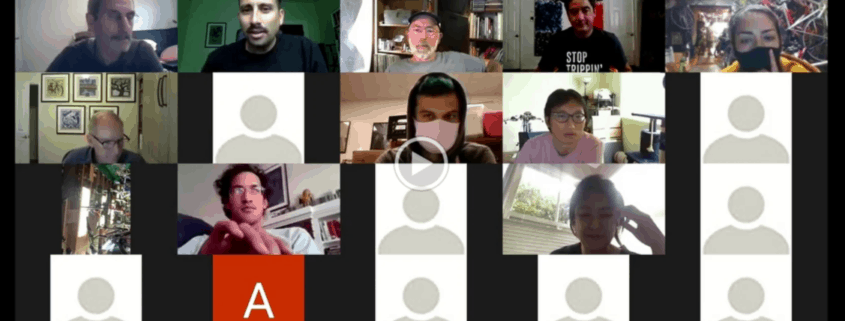CalBike Webinar Elevates the Challenges for Community Bike Shops During the Pandemic
On September 10th, CalBike held a webinar that was joined by more than 25 attendees from California’s community bike shops. We put our heads together, guided by expert government advice, on how to safely continue the necessary work during the COVID-19 pandemic. The goal of the two-hour conversation was to identify challenges for community bike shops and solutions.
This conversation was catalyzed by our earlier article that lifted up what some of the leading community bike shops are already doing to weather the shutdown. Gathering participants from community bike shops across the state, the webinar gave participants a unique opportunity to share local knowledge and best practices to a broader audience.
Community bike shops provide critical services
At CalBike, we value the critical importance of community bike shops to local communities. Community bike shops empower people to build and repair their own bikes. They are often located in disadvantaged communities and serving marginalized residents. These shops provide training, shared tools, and a supportive atmosphere, especially for those who would not otherwise have access to the knowledge and parts to keep their bikes in good working order.
So, when the pandemic arrived in early March, we knew some of our most marginalized partners would face the biggest challenges. From the start, community bike shops struggled to figure out how to stay open and serve their communities while keeping patrons, staff, and volunteers safe. At the same time, we saw a ‘bike boom’ where a surge of ridership resulted in more demand than ever for the services of community bike shops.
This context guided the conversation, but we also dug deeper into ways the state could be more supportive of the local shops, especially in terms of dedicated funding. Laurie Waters, from the California Transportation Commission, helped inform us of potential ways shops can connect to funding opportunities. As a group, we grappled with the limitations of mostly volunteer-run shops competing for state funding. We brainstormed ways to position community bike shops to be stronger and better resourced after the pandemic, as well.
Opportunities to help community bike shops overcome challenges
According to feedback, attendees found the discussion helpful but realized quickly that the barriers to government funding are almost insurmountable for them. Several attendees commented that their shops are not set up as advocacy organizations, so the policy and technical language and skills needed to secure state funding are out of their purview.
These comments succinctly underline the necessary work that needs to be done between and across different bike partners with different access points into the work. And this is exactly why CalBike is committed to strengthening our partnership with existing and new partners who want to advance biking in our state. It is clear that community bike shops are natural allies for advocacy organizations. These grassroots organizations are able to reach communities whose voices are too often left out of the conversation about bicycle safety. We intend to build on that. We hope you can join us.
Here’s the recorded webinar:





